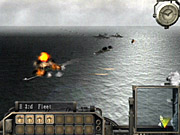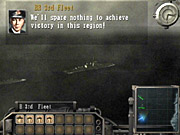As the fourth installment in the Pacific Theater of Operations series, P.T.O. IV is a turn-based strategy game that lets you re-create the great naval battles of World War II by putting you in command of the powerful German, Japanese, British, and United States navies. Individual historical scenarios present different victory conditions, after which you can continue the war from that point on based on the result of the battle. Alternately, a full campaign mode lets you rewrite history from the beginning. You can keep things historically accurate or realign Axis and Allied countries to your liking to create interesting and improbable "what if" situations in the absence of ideology. For example, a Japan-US alliance may take on the combined might of Germany and Britain. As you can imagine, the game is best suited for military buffs and isn't for everyone. Some issues with the AI and the tactical combat also keep it from living up to all its potential.

A clear and functional map shows you every available detail on the war situation and allows you to issue commands. The game requires that you assemble and move fleets to engage the enemy and capture territory with the eventual goal of occupying all key bases on the map. One turn equals one week in game time. Each month ends with a strategy meeting where officers are decorated and proposed strategic objectives are selected by the player. Though not required per se, these goals can be completed as you see fit to obtain extra government funding.
Resource management plays a large role as well. The game is absolutely packed with details, from technical specifications and regional information to info on actual commanders, ships, technology, and more. As such, there are a lot of statistics to pay attention to if you're controlling all aspects of your country's strategy. However, if you're not keen on micromanagement, you can opt to delegate political duties (spying, research, and so on) and building and deploying units to the computer. Though doing so can be helpful, it's something of an all-or-nothing choice, because you can only grant the AI control over broad areas on a turn-to-turn basis.
Delegating everything possible to the computer will definitely skew the difficulty toward the easy side, but since planning is such a large part of your overall strategy, serious players will want to handle most decisions themselves. Doing so allows you to improve your technology as you see fit, using newly developed weapons and armor to create original ship and aircraft designs that can provide great advantages in battle. For reasons like these, controlling every aspect of your country's strategy and production can be quite rewarding, despite being very time-consuming. This is partly due to a somewhat cumbersome interface, but turn-based strategy isn't known for its brisk pace.
The last major element of the gameplay is the tactical game. At certain points, you'll leave the turn-based structure behind to hunt down enemy fleets and airfields in accelerated time. Two settings, normal and fast, are available. Only ships and aircraft participate in battles, which keeps the focus tight but may leave you wishing for ground troops as your ships shell enemy airfields for entire game days. Fitting orchestral themes adapt to the mood of the day-night cycle and flare up when one of your fleets makes contact with the enemy, and one all-purpose voice (American English) keeps you abreast of critical events. You can issue general search and attack orders to each fleet or set locations and targets manually.
Unfortunately, the broad nature of your commands in battle can be quite frustrating. You can't command or target specific ships in the tactical phase except to order a retreat, and there aren't any special formations or tactics to be utilized. Highlighting this deficiency is an easily muddled AI that takes an arbitrary approach to pathfinding, thus frequently splitting up a fleet or creating watery traffic jams based on player input. Few are the cases where cunning will allow a weaker fleet to triumph over a stronger one, though the aforementioned AI problems can have a profoundly negative impact in battle. Even so, when you work around the problems and get things to go your way, battles on the open sea can be quite exciting.

You can view the action from several camera angles, including a free mode, and the clashes can be quite exciting when your plans are carried out as you intended. Rather than going for a completely realistic representation of battle, the game opts for a largely symbolic depiction. Only ships, planes, and airfields are represented. Though a huge battle with swarms of aircraft circling and diving can be impressive, there's really not much visual variety. Landmasses are devoid of any distinctive features, and ships sink with a minimum of dramatic flair. You may also notice that the aircraft take off and land like magic and are disproportionate in size to the ships. However, accurately detailed models and great weather effects lend the right atmosphere to the naval warfare.
While it possesses great overall depth, P.T.O. IV is by no means an unqualified success. The weak tactical game, the lack of an adjustable difficulty setting, and the sometimes cumbersome interface are likely to turn off anyone who isn't a fan of the genre. That said, the game isn't really meant to be accessible. The versatility of the campaign mode and the attention to historical detail should easily appeal to many strategy fans, particularly WWII buffs. Chalk this one up as a partial victory for developer Koei.